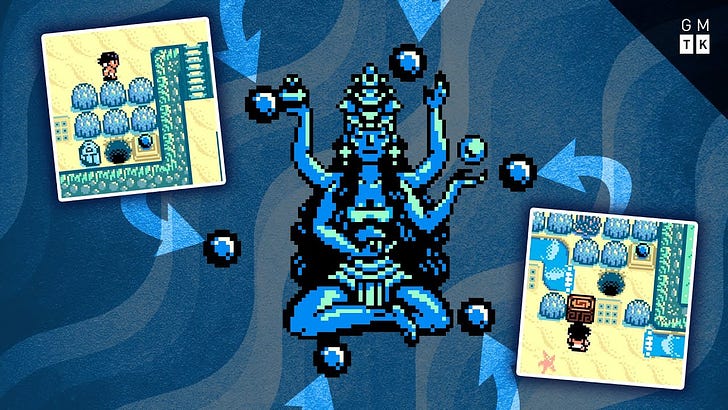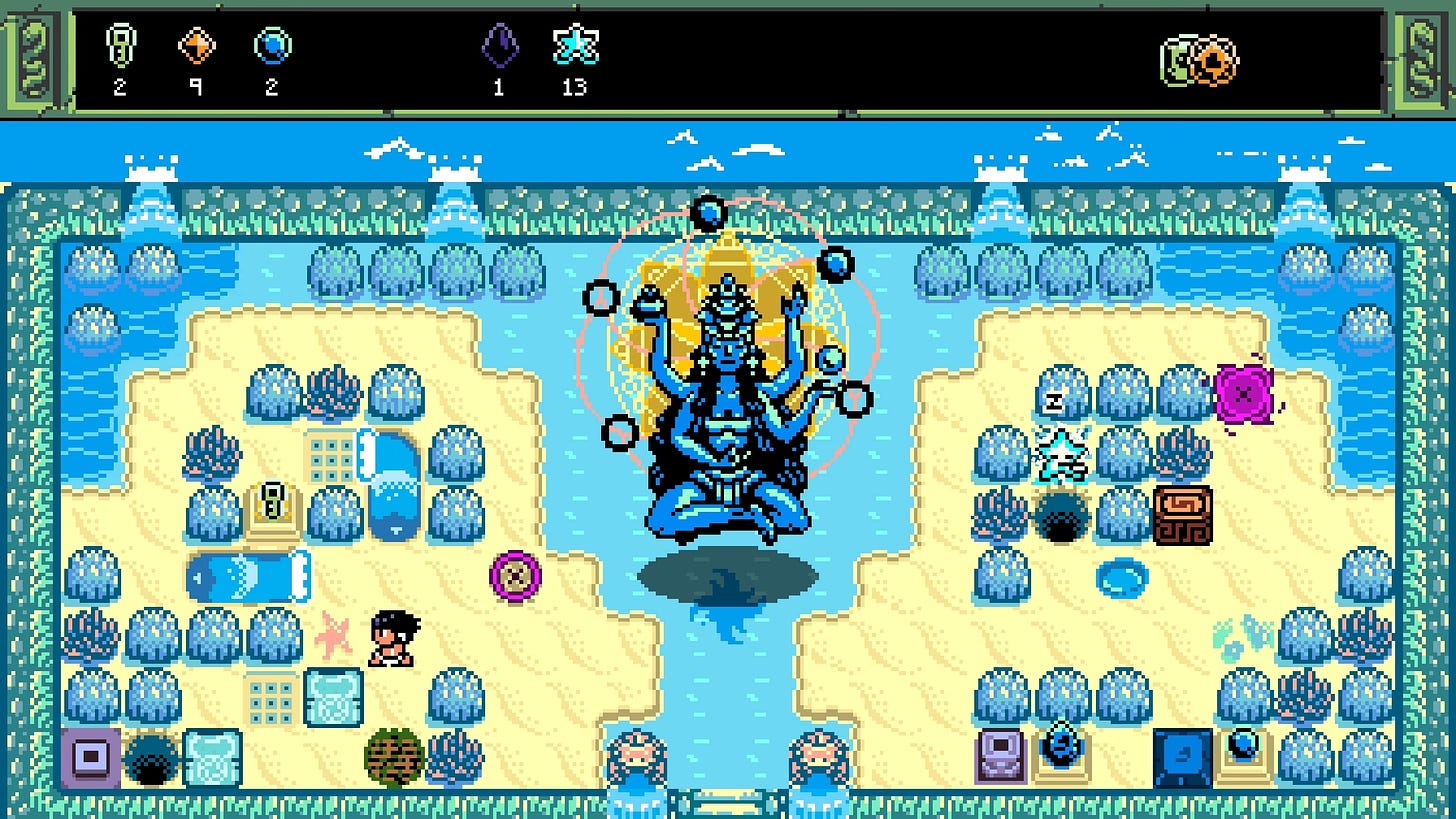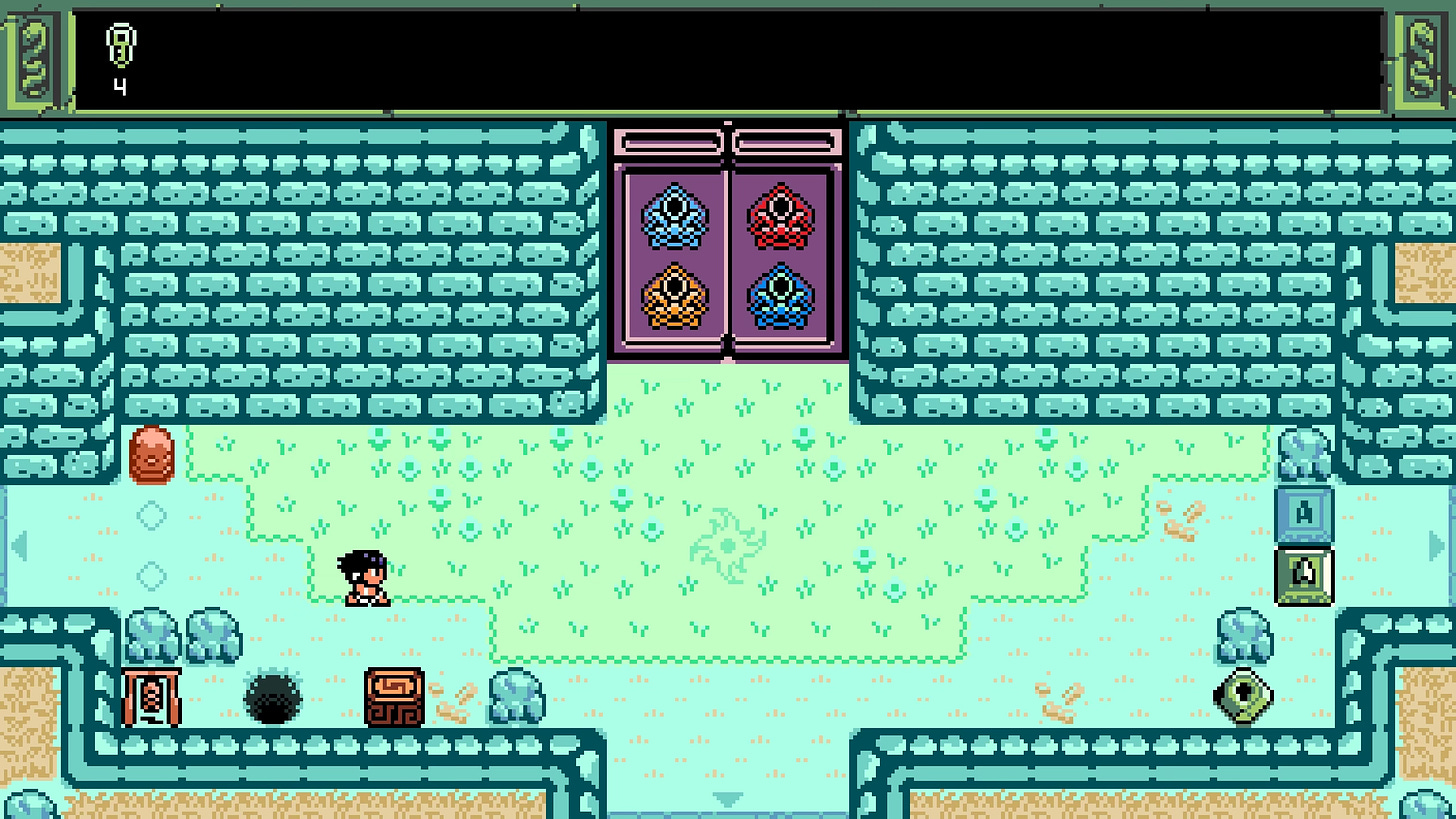May has been an absolutely stacked month for puzzle games.
We got the evocative Metroidvania Animal Well, the offbeat riddle-filled Lorelei and the Laser Eyes, and the retro survival-horror gem Crow Country. Plus Paper Trail, Duck Detective, a Braid remake, and more.
Now these are all wonderful games, and I look forward to talking about them more in the future. But there's one other game that I, actually, might have enjoyed the most. And I'm a little worried that it could get lost in the shuffle of these high profile games. So I'm here to right that wrong, with a new episode of my indie recommendation series: Weekender.
So the game is called Isles of Sea and Sky. And it starts off as a classic Sokoban-style, block-shunting puzzle game. You know the drill by now. You can push blocks in four directions on a tightly-controlled grid. And you can't pull or pick up boxes, so if you push them into a wall or a corner... you're probably screwed.
So you do that for a while until you step onto the back of a gigantic sea turtle who takes you out into the ocean, revealing a sprawling archipelago of different islands. Like a stony mountain range with a network of underground tunnels. Or a fiery volcano with red-hot floor tiles. Or a tidal reef with running waterways.
Each island, of course, introduces new twists on the block-pushing idea. So blocks can now ride down river rapids, and other blocks explode if they get too hot, and so on.
And the resulting puzzles are - on the whole - really good. Each one has some clever central idea, and every mechanic is explored to its fullest. And solving the puzzles involves working through a step-by-step solution that feels like you're in conversation with the designer.
But the most important aspect of this turtle-surfing system is that the game is now fully open for exploration. Sea and Sky is a wildly non-linear game that lets the player tackle its puzzles in any order they see fit. Or skip certain puzzles altogether.
The main way it does this is through collectibles. For instance - each island is home to an elemental deity who is after six special stones. And so you can go off and find these things in whatever order you fancy. But, because you can always find more than six, you can just totally skip the puzzles that have you stumped.
And giving players the chance to pick and skip puzzles has some wonderful benefits.
If you get stuck you can just go off and explore somewhere else - and you may come back to that puzzle later with a fresh perspective and realise how to solve it. It also means that easy and more difficult puzzles can live alongside each other, making the game fun for players of different skill levels. And players get a feeling of agency as they pick their own path through the game.
But being truly open comes with its own challenges. Like... how do you teach new concepts in a structured way? Or ramp up the difficulty with a satisfying curve?
Well Sea and Sky uses collectibles for that, too. The game is never truly open because bits of the world are gated behind pick-ups. There are locked blocks that ask you to find keys. Special stone gates that require a certain number of stars. And obstacles that can't be overcome until you get a new ability, or change the world in some way.
Plus, the hardest levels are hidden behind a big door that can't be opened until you finish all the other islands.
This allows the designer to carefully mete out content on their terms.
Now of course, this is not a brand new structure for a game. Using stars to unlock doors is straight out of Super Mario 64, and other puzzle games have used a non-linear structure - including Snakebird and Stephen's Sausage Roll. But the thing I love most about Isles of Sea and Sky is that you're not just picking between puzzles from a world map.
That’s because there's loads of other stuff to do in between the block-pushing bits. And this is where the game feels less like Sokoban, and more like a Zelda game. So you'll need to carefully explore each world and hunt for secrets and hidden paths. Each island has a cryptic secret that can only be deciphered through careful investigation of the world map. Plus, there's a Metroidvania-style unlock system with new abilities and backtracking.
And these side quests work as wonderful pace-changing palette cleansers between the puzzles.
Because, if I’m being honest, I normally get quite burned out on Sokoban games. An endless string of brain-busting block-pushing puzzles can leave me feeling frazzled and needing a break. But I actually couldn't stop playing Isles of Sea and Sky - and I think a big part of that was that I was constantly hopping between different modes of play.
But there is another challenge with this sort of open design. And, with this one, Sea and Sky doesn't have a particularly great solution for it. And that's the idea that you can stumble upon puzzles that you can't actually finish in your current state. Maybe you need to come back with a new ability, or you need to cause a change in the world.
And so you can spend significant time just faffing around with a puzzle that is actually impossible to finish. Which never feels great - and then it has the knock-on effect of making you distrust other puzzles and you end up skipping ones that you actually can solve! Agh! I talked more about this idea, and offered some potential solutions, in a video about Banjo Tooie - so check that out if you want to learn more.
Anyway - I really enjoyed Isles of Sea and Sky. And it's also wonderfully accessible: the controls never get more complicated than pressing a direction on the d-pad. And it has a super forgiving system of infinite undos and instant room restarts.
Now - I finished the game in about 12 hours. Which is... okay, the idea behind Weekender was to recommend indie games that you can finish in a single weekend. And that's not really true of this game unless you absolutely binge it like a maniac. But I've realised that the whole 'weekend' thing is a subjective and pretty arbitrary restriction that has stopped me from talking about cool games that are a bit longer or don’t have an exact ending.
So going forward I'm ditching that idea , and I'll just tell you how long the game is in the post. And so "Weekender" can mean... a game I recommend you start playing this weekend!
See you soon,
Mark




